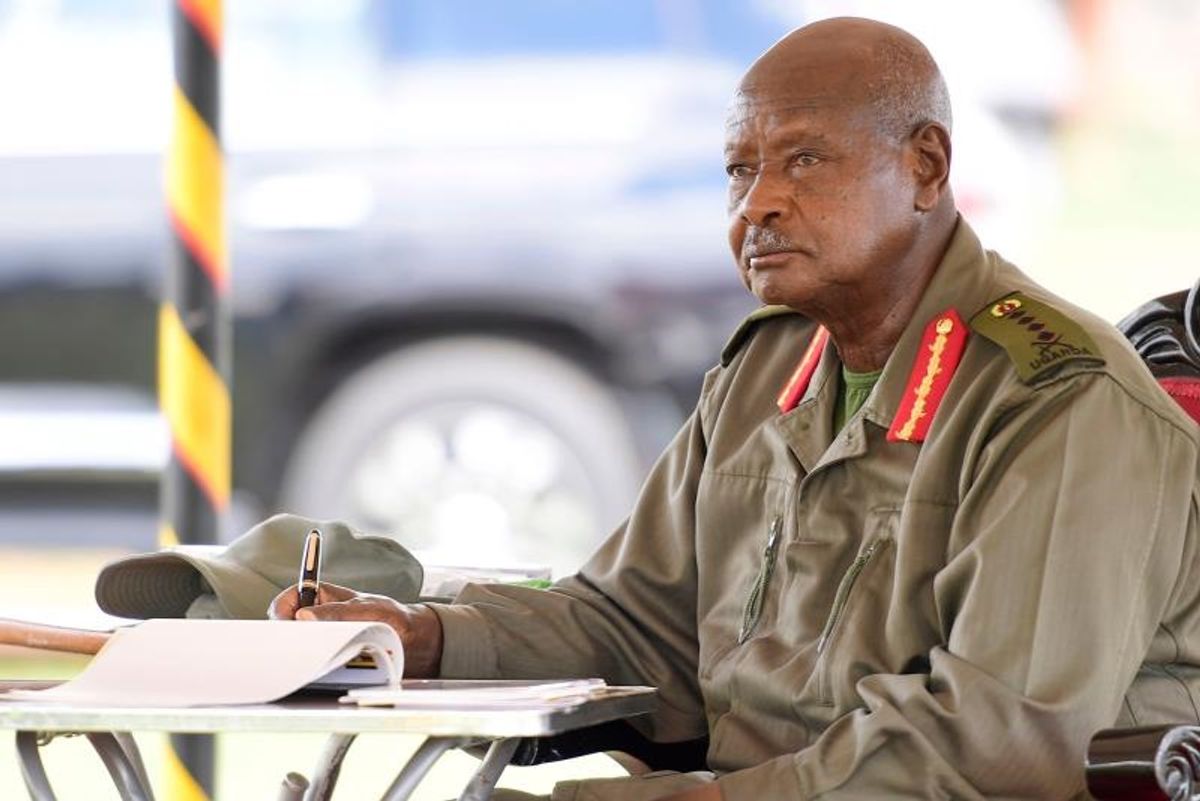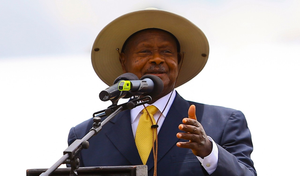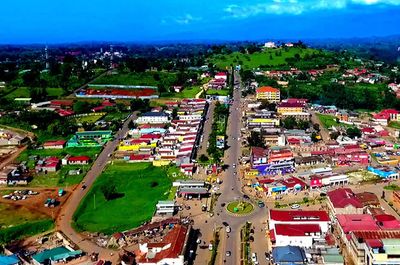
Uganda’s latest State of the Nation address, delivered by President Yoweri Museveni on June 5th at the Kololo Independence Grounds, marked the National Resistance Movement’s (NRM) “correct ideology”. Those ideological principles are: patriotism, Pan-Africanism, socio-economic transformation and democracy.
Museveni referred all this to the Biblical story in the Gospel of Matthew 7 24-27. The reference is to two kinds of builders: the wise builder and the foolish builder. The wise man built his house on the rock; the foolish one built his house on the sand. Accordingly, “When the rain, floods and wind came upon both houses, that of the foolish man was swept away, because its foundation was weak; while the one of the wise man remained standing, because its foundation was firm and strong,” he referenced.
This fits the NRM ideology that promotes the “mass line” of the social uplifting of all segments of society. It underlines the putting in practice of the nation’s programmes, such as the Universal Primary and Secondary Education (UPE) and (USE), the Parish Development Model (PDM) and mass immunisation that have led to improvement in the livelihood of the populace.
Thus, life expectancy is now 63 years. Nearly 40 years ago, when the NRM came to power, it was 45 years. The population was then 14 million compared to 46 million people now. The literacy rate has also improved from 43% in 1986, to 80% now. Then, more than 90% of the population was “trapped in subsistence farming”. Now they are only 33%.
Museveni made these illustrations to indicate the function of the “the mass line programmes” as the most effective way of triggering socio-economic transformation. He referred to ten priorities that the Government is following.
The most prominent of these is peace and security. He noted that Uganda is a bastion of calm in the East Africa region, imbued with conflicts. Nearby, around the country, are wars in the Democratic Republic of Congo (DRC), South Sudan and Sudan.
He attributed the peace to the work done domestically by the Uganda People’s Defense Forces (UPDF), Police, and the Intelligence Agencies. The Government has also made significant investments in border security and has continued to engage in joint regional operations to curb transnational threats, he added.
The others are: the industrialization, with focus on building factories, which use locally available materials as inputs; export promotion and import substitution, by boosting the domestic manufacturing capacity; strengthening the private sector; and in this, skilling the youth free of charge, through the zonal industrial hubs, with skills like: tailoring, carpentry, metal fabrication, welding, shoe-making, weaving, hairdressing, knitting, plumbing and motor mechanics.
And he said that others are: restructuring the Government to rationalize its expenditure by increasing revenue collection, by Uganda Revenue Authority (URA); and, market access for exports in the regional and international markets. And all these function properly in a state where corruption is being ardently discouraged.
The President said these have underscored Uganda’s impressive economic growth, which was recently ranked as the seventh fastest-growing economy in the world by the International Monetary Fund (IMF). “The size of the economy is projected at UGX. 224 trillion, or approximately $60 billion by the end of June 2025,” Museveni said, noting that the growth rate is 6.7%, in the last quarter of the financial year, surpassing the previous year’s rate of 5.6%.
Museveni also underscored that the economy is now increasingly diverse, and does not now depend on traditional commodities.
In 1986, the economy depended only coffee, cotton, copper, tobacco, tea and tourism. The Harvard Economic Growth Laboratory has revealed that Uganda has added 20 new exports over the last decade, including vaccines, Information and Communication Technology (ICT) equipment, solar panels and advanced pharmaceuticals. He added that the country is on to exporting serums, electronics and bio-technology. “In the 12 months to March 2025, export receipts of merchandise trade increased to $9.3 billion,” Museveni added.
A combination of these factors has made the Ugandan shilling the most stable currency in Africa, appreciating by 6.1% over the past year. Inflation has remained under control, with a projected rate of just 3.6% for 2024/25. Museveni attributed the country’s success to deliberate and strategic Government’s focus on economic empowerment interventions.
The purchasing power parity (PPP) of the shilling by this month will be US Dollars 187 billion measured by the Atlas Method. This growth rate translates into higher household incomes, to US Dollars 1,330 per capita income, up from US Dollars 1,259 in the previous financial year.
The latest National Household Survey Report by the Uganda Bureau of Statistics (UBOS), shows Ugandans living below the poverty line has fallen to 16% from 20% four years ago. The UBOS report revealed that income inequality has also declined to 38% from 41%, according to the GINI co-efficient assessment, a statistical measure used to determine income inequality within a population. “With the continued implementation of the PDM, we are on track to completely wipe out poverty, in the near future,” Museveni affirmed.
The PDM, on its third year of implementation, has received UGX. 3.3 trillion, with some of the beneficiaries using it to start enterprises among which are; food crops farming, goat keeping, piggery and bee keeping
All this has happened despite the reductions in donor funding. Key donors, notably the US and the World Bank, have cut back aid over concerns on Uganda’s Anti-Homosexuality Act. It attracted widespread international criticism, because Ugandans are averse to this nefarious sexual aberration.
Yet, Uganda had not been derailed, and has also implemented major projects in roads, energy, ICT, education and healthcare, Museveni said. “We are soon finalising the construction of the 1,443 km East African Crude Oil Pipeline (EACOP) from Buliisa to Tanga. The construction of the Standard Gauge Railway (SGR) is soon starting, as well as the oil refinery in Hoima,” Museveni stated.
Accordingly, these achievements are not by mistake, President Museveni said. The Government’s initiatives have included:
capitalizing Uganda Development Bank by UGX. 1.45 trillion for the provision of affordable capital to manufacturers and small businesses; PDM with UGX. 3.4 trillion; Emyooga with UGX. 553 billion; and the Youth Livelihood Programme (YLP) with UGX. 207.95 billion.
Others have been: the Uganda Development Corporation (UDB) with UGX. 1.2 trillion; the Agricultural Credit Facility, with UGX. 495 billion; the women’s development programmes of GROW with 842 billion, INVITE with UGX. 800 billion, and, Uganda Women Entrepreneurship Programme (UWEP), with UGX. 168 billion, respectively. Then, there is the Youth Venture Capital Fund, which has been capitalized with UGX. 12.5 billion; and the Small Business Recovery fund of UGX 100 billion.
Uganda has also a number of mineral resources the President enumerated in almost all parts of the country. Accordingly, the country has the opportunity to industrialize quickly, with acquisition of technology and specialized skills development. He said for instance that the minerals used to be exported in raw form. This meant donating all the benefits, such as jobs and money, to other countries. But now, for instance, there are ten gold refineries in the country, producing refined gold to 99.9 percent purity, Museveni added.
As regards to oil and gas production, the Government is investing in the requisite infrastructure for commercial production with the civil works for the EACOP pipeline nearing completion, next financial year, both in Uganda and Tanzania. This will ensure security of fuel supply, reduction in petroleum pump prices and ensure quality of petroleum products on the market. The President said that since the Government started implementing this initiative, Uganda has experienced reduction in fuel pump prices.
In science, technology and innovation (STI), the President commended Ugandan scientists for nurturing nascent knowledge. “Our scientists have been active in developing automobiles, vaccines, electronics, therapeutics, diagnostics and other healthcare tools,” he said. He credited Makerere and Gulu universities’ scientists for innovations. In Makerere, they have developed a PCR kit that conducts more than saving the country US Dollars 37 million per year, while Gulu university scientists have developed highly effective and rapid testing kits for crop diseases for cassava and sweet potatoes. He mentioned Prof. Patrick Ogwang’s clinical trials of natural therapeutics.
Museveni said that the Government had prioritized infrastructure development especially roads, railways and electricity, which has provided the country with a solid foundation to support industrial development. “All parts of the country are interconnected using tarmac and good murram roads. This means whatever is
produced in the country can easily reach the markets. It also means that the cost and time of moving goods has reduced significantly facilitating both investments and trade, “ the President added..
He concluded his speech saying that the Government is aiming at a half trillion dollar economy. He said the four key areas to drive this rapid growth are: agro-industrialization; tourism and travel; mineral beneficiation and manufacturing, including oil and gas; and, fourthly, STI, including ICT and digital transformation.
“What I have said in this long speech is that: Uganda is now unstoppable in terms of economic growth and social-economic transformation. Our security apparatus is also robust. All this, is in spite of the mistakes of the careerists that infiltrated the civilian echelons of the NRM and even within the UPDF to some extent. These are normally after personal enrichment and power. They hardly bother with the salvation policies of Uganda or Africa,” President Museveni said.














Ikebesi Omoding
Ikebesi Omoding is the acclaimed author of a weekly column titled: From the Outside Looking In
Leave a Comment
Your email address will not be published.